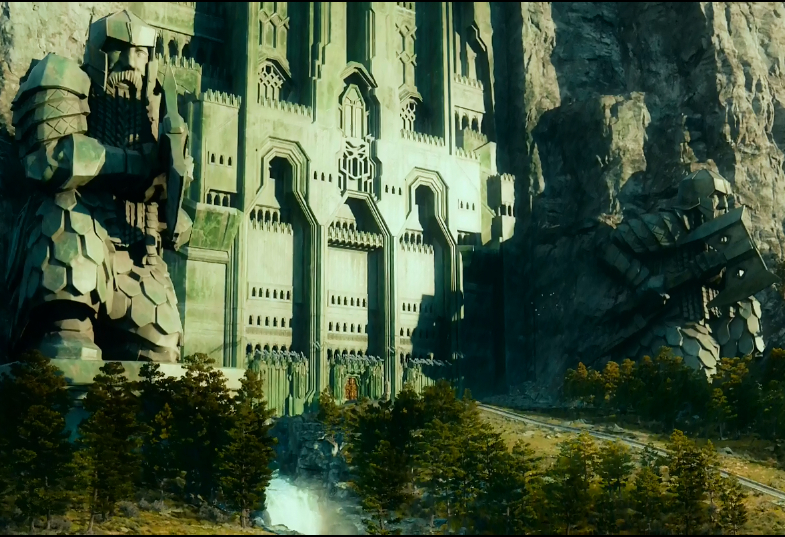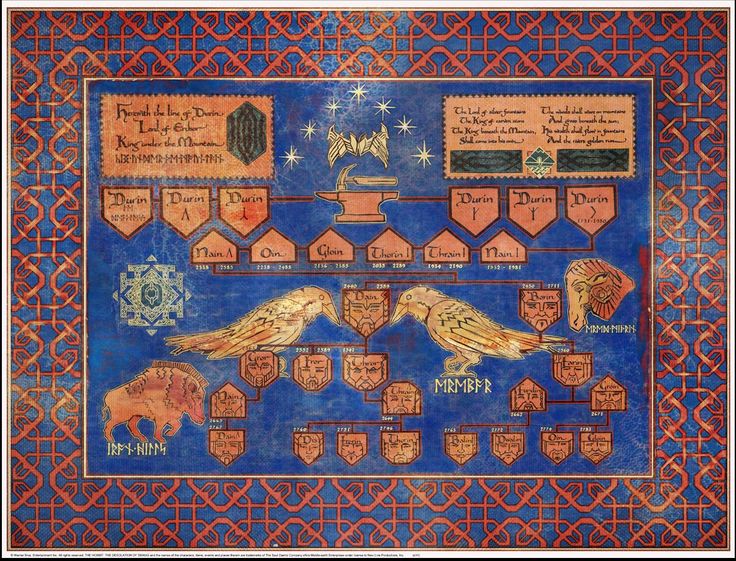Fans of Tolkien’s Dwarves may have already discovered the impressive work of The Dwarrow Scholar. You may remember that The Dwarrow Scholar served as one of our honored judges in our first Tolkien Language Haiku Contest during Tolkien Week in 2015.
As The Dwarrow Scholar prepares to unveil some exciting new projects, Middle-earth News Assistant Director Valdís was fortunate enough to interview him about his interest in dwarrow lore and about the upcoming projects.
Valdís: You’re The Dwarrow Scholar. How long have you been writing your blog?
The Dwarrow Scholar: The blog was initially created some four years ago on the mymiddleearth site, when the blog hosting there closed down I moved it to wordpress. Last year I also started a tumblr blog, aimed to answer the questions of writers of fan-fiction and students of the Neo-Khuzdul I provide via my wordpress blog mainly.
Valdís: What spurred you to start writing your blog?
The Dwarrow Scholar: Before I started writing my blog I was quite active on one or two minor Tolkien forums for several years, most of which sadly have closed down since, where I tried to share my views and what I had learned by studying Tolkien for many years. It didn’t take long before I started to post whole articles there.. so many of the thoughts I had jotted down once, but never shared. Looking back, I think I was so eager to talk to people with the same interest I ended up sort of spamming those forums / anyone out there that was on those old forums, sorry about folks. Some years later I ended up copying many of these articles on the site of Durin’s Folk, my Lord of the Rings Online kinship. One of the members there, who is still a good friend of mine, suggested I should start a blog… so soon after, I did.
Valdís: You have just launched a brand new site “dwarrowscholar.com” where on the “about” page, you write about your intense love for dwarves. What is it that fascinates you about Tolkien’s dwarves?
The Dwarrow Scholar: I guess it comes down to not letting go of an old love combined with childish curiosity. I mean, I fell in love with dwarves when reading ‘The Hobbit’ as a young boy, a love that never left me. That combined with the fact that Tolkien wrote so little about dwarves (compared to elves) it leaves one with a continuous hunger for answers. It really is a matter of the “fascinating unknown”. And the more you learn about them, or even think about those bearded delvers, the more you give in to that love and devotion. Via the new dwarrowscholar.com site I hope to share that love with all freely, while providing a handy single point where people can find my latest dwarvish blog articles, videos and resources.
Valdís: When did you start studying Tolkien-based languages?
The Dwarrow Scholar: I’m not sure if I gradually landed in the field of Tolkien’s languages or subconsciously drifted towards them the more I read the Professor’s work. But seeing I have a profound love for learning languages I guess it was something that was bound to happen sooner of later. I can’t really put a fixed year on it, but I think it must have been during the mid 1990’s. The thing is, and I think this can’t be stressed enough, J.R.R. Tolkien didn’t just create languages, he was a master at it. Every single word he created was not pulled from thin air, but had a very solid linguistic base. And that just demands respect. Middle-earth literally wouldn’t exist if it weren’t for the languages he devised. Hence if you really want to delve into Middle-earth and its inhabitants you really can’t afford to NOT study his linguistic work.
Valdís: How did you begin learning about Neo-Khuzdul?
The Dwarrow Scholar: Though I had started to note down my ideas on Khuzdul sometime during the mid 90’s I think it really picked up the pace a few years later… though it wasn’t called Neo-Khuzdul at the time. Linguist David Salo had made a few dwarvish words for the Middle-earth Role Playing Game. These looked a lot like existing Khuzdul words, but weren’t really in line with what much of what Tolkien had written. A few more years later when ‘The ‘Lord of the Rings’ movies came out some fan-sites gradually began putting up some of the non-English lines that were used in these films. This version of expanded Khuzdul (also made by Salo, now called Neo-Khuzdul) looked more like an actual Semitic language (which Khuzdul is supposed to be based on), though still in many ways using some non-Semitic logic. Still, I was excited when I started reading what he had come up with for these films, as here I found something that I had been doing on bits of paper for years… trying to expand Khuzdul, while respecting the Semitic nature of the language and what the Professor had written. I decided then that I would try to gather these Neo-Khuzdul words and grammatical structures and study them more closely. As a result many of Salo’s early linguistic concepts on dwarvish eventually ended up in the first Neo-Khuzdul version I wrote down. Years later when ‘The Hobbit’ films were made we really saw a version of Neo-Khuzdul that was much more fleshed out, a (near-)Semitic language, and more in line with Tolkien’s writings. As I was studying this new material I felt there was a need for me to learn more about Semitic languages, so I ended up studying Arabic and Hebrew. This led to a better understanding of Khuzdul. And also led me to form my own views on Neo-Khuzdul, which was vital for me to expand the language further than Salo had done. Something I had by then set as a personal goal, in tribute to Tolkien, to expand his dwarvish language into an actual “speakable” language. A goal which is ever-ongoing.. so learning it never ends really.
Valdís: What are some of the most common questions you’ve been asked through your blog?
The Dwarrow Scholar: There’s not really a returning question I get over and over again, but I would say the most common group of questions are those related to translating English every day verbs like “to be” or “to have” into Neo-Khuzdul. People often have a challenging time grasping the very different way my Neo-Khuzdul version handles these verbs. That’s also the reason I made several support documents (found on dwarrowscholar.com/library) on such topics, so people can have a look at those and understand the logic behind it better. I really think it is important to teach people the basic structures and concepts of the language, instead of just translating words for them, as it allows them to translate on their own, instead of depending on me. Which I’m fine with (always happy to aid when I can), but translating on your own really helps tremendously with learning the language I think.
Valdís: What are some of the strangest questions you’ve been asked?
The Dwarrow Scholar: Not sure it counts as a “strange” question, but someone asked me recently to translate the dictionaries of my Neo-Khuzdul version to Elvish. I’m all for better dwarf-elf relations, but I doubt there would be much use for such a translation — apart from the fact that it would take me many years to complete it. Other than that there have only been a few “strange” questions really. A few years ago someone asked me if I actually was a dwarf myself. I had to think about that for a bit, but in the end decided to answer: “I consider myself a man of average height, limited facial hair (compared to a dwarf) and crappy axe skills… though, in my defense, I think I can stomach alcohol better than most. Still a man, but with strong dwarvish ambitions.”
Valdís: You have been working on some very ambitious projects. Would you please tell us what you’re doing?
The Dwarrow Scholar: Gladly. I’ve been working on new interactive lessons for my Neo-Khuzdul material. These will be taking a very hands-on personal approach and introduce a much more organic and natural way of learning. It’s a massive project though and thanks to the help of many people, including my fantastic patrons, it slowly is becoming a reality. The scale of the project is a bit daunting at times, but we press on regardless, aiming to get it online early/mid 2017. Other than that I’ve recently finished “The Annals of the Dwarves”, (downloadable freely on June 1, 2016) which is my first attempt at story-oriented fiction based on the works of Tolkien. It tells the history of the dwarves from a dwarvish point of view, aimed at fan-fiction writers, RPers and players of LotRO (as it includes many references to this online version of Middle-earth). It was tremendous fun to work on this and hope people find it entertaining and useful. Lastly, the YouTube lessons haven’t been forgotten, and a new one is on the near horizon.
Valdís: In all of your study of dwarf culture and history, have you developed a favorite dwarf family or clan? If so, which one and why does it appeal to you?
The Dwarrow Scholar: Tolkien really only ever wrote about the Longbeards, with few exceptions, so it’s difficult not to think of the Longbeard clan when thinking of a favorite. My love of dwarves started when I read ‘The Hobbit’ as a child, in particular the character Thorin embodies that love for me. Let’s face it, Thorin is contemptuous, suspicious and even reckless… but regardless of those flaws he understands devotion to friends and gratitude to those who help him. Those first impressions as a child reading of the dwarves and Thorin… well they felt like “friends” to me. They didn’t feel like attention-hungry undying creatures with a superiority complex (nothing personal tra-la-la-lally elves).
Valdís: What advice do you have for fans who would like to start learning Tolkien-based languages?
The Dwarrow Scholar: Try to use it every day, even if it’s only for 15 minutes a day. I don’t mean you need to shout “Du bekâr! (to arms!)” while sitting in a work meeting (though you very well may), but one thing that could really help is to note down the things you see (5 words or so a day should do it), then using the available tools to translate these words, repeat them regularly and try to use them in a sentence (even if you need to use other English words or verbs in that sentence at first). After a few weeks you’ll be able to string more complex sentences together. Other than that, stick with it, but don’t over do it either, find a pace that works for you.
Watch Middle-earth News for the link to The Annals of the Dwarves when it becomes available for free download on June 1, 2016! The Dwarrow Scholar’s new site, dwarrowscholar.com, is live NOW!
If you are interested in supporting The Dwarrow Scholar’s work, you can become a patron on Patreon.
Middle-earth News thanks our friend The Dwarrow Scholar for taking time to talk with us. May his beard grow ever longer!






One Comment